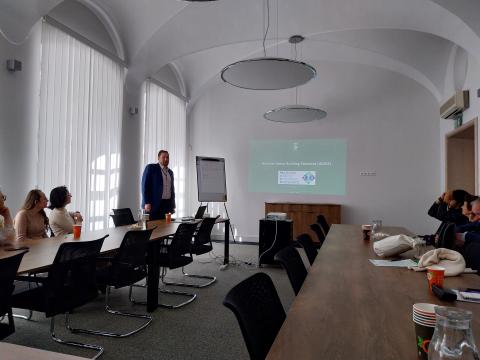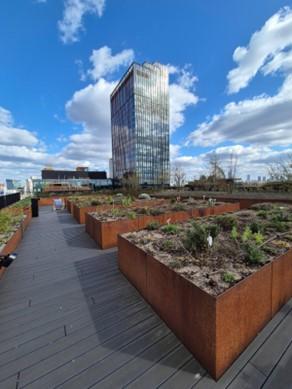Mazovia Energy Agency welcome the partnership to Warsaw
On the 8th and 9th April, Mazovia Energy Agency hosted the Frugal Cities Partnership for a Study visit in Warsaw. The Study Visit kicked off in the EkoCentrum Punkt Zwrotny, a hub for promoting sustainable practices and training youth in eco-friendly activities. The partnership was able to explore the hub and learn from the practices carried out there- these include community spaces, workshops, meeting rooms and resource sharing. The participants were shocked by the amount of clothes that cannot be recycled due to the chemicals used in manufacture and the range of different materials.
Next up was short spin to the headquarters of Mazovia Energy Agency to hear about the Warsaw Green Building Standard. Warsaw Municipality have introduced regulations for developing all new municipal buildings ensuring sustainability, efficiency and resource conscious construction. The standard also includes specification for rainwater harvesting, LED lighting and biodiversity friendly lighting externally ad internally. This ensures that wildlife is not impacted by increased lighting from buildings. The partnership was very interested in employing the standard in wider circles in their own regions.

The partnership then visited the Library Rooftop Garden at the University of Warsaw. This is an example of how Blue/Green infrastructure can boost well-being in the city by creating green spaces for citizens and preserving biodiversity. Moreover, the university has a ‘social fridge’ where anyone can donate unwanted food and take other items. The ‘social fridges’ practice is very successful in Warsaw with 47 food sharing points across the region.
Up next was The Forest Campus Green Office. The buildings here is designed to optimise energy resources with efficient lighting, heating and cooling, ventilation and water management. Each building is painted with an anti-smog paint that absorbs C02 reducing the impact of pollution. Additionally, the windows filter the air protecting the inhabitants from pollution ingress. The buildings are used for co-working offices with over 3000 workers per day. The office also suppliers showers and bicycle storage.
Day two of the Study Visit was filled with practices that reduce waste generation and promote engagement with the citizens in Warsaw and the surrounding region. Attendees heard about the Social Stores enabling struggling citizens in receipt of social welfare, access to food, clothing and materials at massively reduced prices.
The FabLab Cooklab is an urban kitchen reducing food waste through donation of unwanted food items. The FabLab also allows access to equipment such as 3D- printers, laser cutters and electronics to foster innovation, engineering and digital support for small businesses.
Lastly on the Study Visit, the partnership learned about the Eco-advisors engaging physically with citizens about sustainability. Community engagement has been identified as a key aspect of employing sufficiency and long-term sustainability. The Eco-advisors engage with citizens to reduce energy consumption and energy poverty in vulnerable areas.

